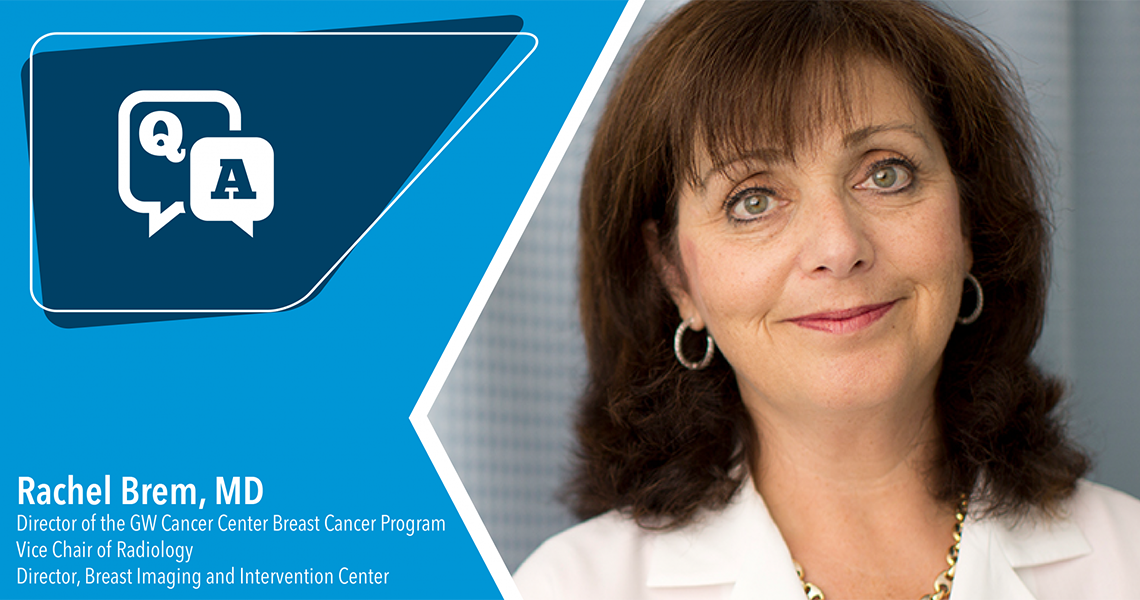Dr. Brem is an expert in the field of radiology and breast cancer diagnosis and treatment. Since arriving at GW in 2000, Dr. Brem has been instrumental in developing a state-of-the-art, patient-focused breast imaging program that integrates compassionate care with the latest technology. As a breast cancer survivor herself, she brings a unique perspective to her work and has been an advocate for further education, awareness and legislation to improve breast cancer care.
What brought you to GW?
I came to GW over 18 years ago with the anticipation of working as a collaborative team to build a world class breast imaging and breast cancer program. It was clear to me that the supportive and collaborative environment would be a terrific environment and opportunity. It certainly has been. In addition, the opportunity to lead the GW Mobile Mammography program, the Mammovan, has been extremely fulfilling, offering free mammograms to women in underserved communities in Maryland, and DC. This is particularly important since DC has the highest death rate from breast cancer in the United States.
How did you decide on a career in the cancer field?
My mother had breast cancer when I was a child and that was the initial inspiration to try to make a difference. As a medical student at Columbia University in the 80’s, I began to see what early detection can do to save lives and I wanted to be part of that. That is why I chose to pursue a career in radiology and breast imaging. After a pursuing a career in breast imaging and becoming the Director of Breast Imaging at Johns Hopkins, I was given the opportunity to build a patient-focused, state-of-the-art, research-focused breast center at GW. My time at GW has been extraordinary with its growth to one of the largest breast programs in D.C. with state-of-the-art technology as well as internationally recognized faculty.
If you weren't in medicine, what would you be doing?
If I weren’t a doctor I would be in another aspect of health care, perhaps public health. I can’t think of anything that would be as fulfilling. I’ve seen the need for patient education and support in all communities, and especially in the underserved community. Thirteen years ago, together with a number of friends and patients, we started the Brem Foundation to Defeat Breast Cancer to support education for women in all socio-economic levels, supporting two breast imaging fellowships at GW, all of whom have required community service responsibilities, and we support diagnostic care and biopsies in the underserved community.
What inspires you most about your work?
My patients and my colleagues. Seeing both the difficulties after a breast cancer diagnosis and also seeing so many thriving breast cancer survivors inspires me every day. In addition, the GW Breast Center has the most extraordinary breast imagers, breast surgeons, medical oncologists, plastic surgeons, geneticists and so many more. Not only is this collaborative group dedicated and passionate, they are the most wonderful people and outstanding colleagues. I feel so fortunate to be a part of this group every day.
What is a current project or work you are excited about and why?
I am extremely excited about developing the collaboration between the breast cancer clinicians and researchers in the GW Cancer Center. We are at a pivotal time at the GW Cancer Center. We have outstanding researchers as well as extraordinary internationally recognized clinicians. I am extremely excited about increasing the collaborations with the result being more translational research that will help implement exciting new findings and help patients.
In addition to your work in radiology and imaging, you also oversee GW's Mobile Mammography Program (the Mammovan). Can you tell us a little about that program and why it's important?
The GW Mammovan breaks down all barriers so that underserved women can get free, lifesaving mammograms with the newest 3D technology. It is one of, if not the longest running mobile mammography programs and I am very grateful to the Medical Faculty Associates (MFA) and GW Cancer Center for their support in our program and others for their support of our new, beautiful GW Mammovan.
October is Breast Cancer Awareness Month - what's one thing you wish people knew about breast cancer that's not often talked about?
I would want everyone to know two things. Firstly, there is a great deal of conflicting data about the need for mammographic screening. The bottom line is that regardless of what is said, EVERYONE agrees that annual screening mammography beginning at the age of 40 is the only way to save the greatest number of lives. All other recommendations will result in more women dying from breast cancer. That is clear and absolute. In addition, screening for breast cancer is not just mammography. We use a risk-based screening protocol which includes ultrasound, Magnetic Resonance Imaging (MRI) and Molecular Breast Imaging (MBI). By the way, MBI, a cutting edge technology that looks at how breast cancer functions, not just looks, is only available at GW in our area.
What makes GW unique when it comes to treating patients with breast cancer?
Combining state-of-the-art technology, with the most outstanding, internationally recognized faculty who are passionate and compassionate about the care of our patients. In addition, we have cutting edge technology that is not available elsewhere in our area. Finally, the ability to be part of and benefit from the research strengths of GW makes it unique.
What advice would you give to an aspiring medical student who wants to work in your field?
Go for it. I have the best job in the world; I can’t imagine anything more rewarding, wonderful or fun. I am truly fortunate. In addition, I have had the opportunity to research and implement new technologies that have moved the field forward. So, don’t just practice outstanding medicine, but ask the questions and investigate so that you can have the rewards and satisfaction of advancing the field you have dedicated your life to.




